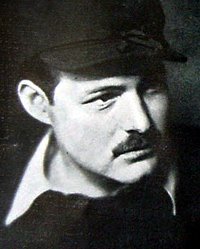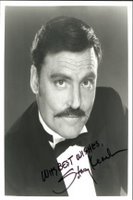If there i
 s an author whose public persona has done more damage to the common perception of his or her writing than Ernest Hemingway, I don’t know who that author is. The name alone brings to mind all sorts of notions of ballsy machismo, tough guy posturing, the man’s man, the Great White Hunter, Bwana on Safari. There is a significant reading population out there who simply find that attitude, that emphasis unappealing. A great number of female readers I’ve met have intimated that they have very little desire to ever crack a book by Papa.
s an author whose public persona has done more damage to the common perception of his or her writing than Ernest Hemingway, I don’t know who that author is. The name alone brings to mind all sorts of notions of ballsy machismo, tough guy posturing, the man’s man, the Great White Hunter, Bwana on Safari. There is a significant reading population out there who simply find that attitude, that emphasis unappealing. A great number of female readers I’ve met have intimated that they have very little desire to ever crack a book by Papa.This is certainly too bad. I’m not saying there aren’t quantities and quantities of passages that are all about preening male egos and landing bass or swordfish or what have you. That stuff is there, it exists. If the idea of bullfighting and every thing it entails disgusts you, even stories about toreadors in which all the action takes place outside a ring, then you’re going to have to be selective.
But so much of that, so much of the hunting and fishing is merely atmosphere and setting; behind that lurks the kind of stories that really strike a nerve about how men and women live with each other, how we communicate our desires or fail to, how our dreams can sometimes lift us to ecstatic heights or crush us completely, irreversibly, and how we simply get on despite everything, how we live, teeth gritted, hearts racing, planet spinning under our feet.
I’m saying there is a reason that Hemingway is a celebrated writer, a reason that has very little to do with him being one of those canonical Dead White Males. Would the stories be as lauded if they were written by a Black man? An Indian? A Native American. A woman? Probably not. No matter how good a writer is, we’re going to have to deal with the fact that from time immemorial, DWMs have had a lock on things. And yet, Hemingway is good, damn good, despite that.
Of the v
 arious readers of Hemingway, Stacy Keach is quite simply the very best. To even look at pictures of the two men, you’d be struck by just their physical resemblance. Christ, he even played the man in a rather tired 1988 biopic. The two other readers of note, Charlton Heston and Hemingway himself aren’t fit to hold Keach’s reel-to-reel recorder. The author himself reads in a kind of strained, high nasally pitch, an effeminate accountant’s voice that might have played some small role in Hem’s desperate need to appear tough. Heston on the other hand plays the stories to their XY chromosome full hilt, draping himself in full NRA martial glory, eating punks for breakfast.
arious readers of Hemingway, Stacy Keach is quite simply the very best. To even look at pictures of the two men, you’d be struck by just their physical resemblance. Christ, he even played the man in a rather tired 1988 biopic. The two other readers of note, Charlton Heston and Hemingway himself aren’t fit to hold Keach’s reel-to-reel recorder. The author himself reads in a kind of strained, high nasally pitch, an effeminate accountant’s voice that might have played some small role in Hem’s desperate need to appear tough. Heston on the other hand plays the stories to their XY chromosome full hilt, draping himself in full NRA martial glory, eating punks for breakfast.Heston misses the point completely while Hemingway is as bad a reader as a great number of authors, stringing out his breaths without good pacing, hitting the wrong words hard, rushing where he oughtn’t. Keach on the other hand is a consummate actor and quite frankly reads like a jungle cat purring. He touches Hemingway’s stories’ raw physicality without grunting in savage He-Man endzone celebration. Keach used to be something of a name brand talent back in the seventies (and part of me will always think of him alternately as Mike Hammer or as Sgt. Stedenko, depending on my mood), though in recent years he’s been reduced to crummy bits in TV, doing voice work in cartoons and PBS specials, and delivering up some of the finest audiobook work going.
The fifteen disc collection The Short Stories Gift Edition put out by Audioworks make up the collection known as “The First Forty Nine” which leaves twenty one stories undone as yet, enough for maybe five or six more discs to finish it out. Of course, these first just shy of fifty tales are the best Hemingway wrote, which is not to disparage the remaining ones, but they aren’t nearly as essential, nearly as important as those first ones.
There is a little music at the beginning and end of each disc. The first five start off with a melancholy bit of cello and it only took those first notes to clearly inform me that these readings were going to be done right. That elegiac single cello emphasized what many people fail to grasp about the work of Hemingway, in that it is primarily a work that is melancholic. Most people first think masculine, manly, blunt, drums. There is more music, a mournful piano elsewhere, a feeling of consistency throughout that testifies to the depth of understanding involved.
Each story touches on death in one manner or another, the ghostly presence running as a slight chill, the stripped down narrative wanting to do nothing to disguise that fact. Hemingway wrote that his style was akin to an iceberg: what you read was only the ten percent of the iceberg visible. A master of economy, Hemingway’s work implies much, suggests more, says little. The parts of the iceberg we don't see is always how many death has undone, the personal cost of their actions to the characters, the way their mind works that their actions will only partly later reveal.
What else is “The Snows of Kiliminjaro” but a reflection on everything lost and all the lies told in our lives, the way they haunt us. It is a story filled with stories, all the stories the main character will never write never tell never have again. In listening to this tale, it is hard not to be struck by the idea of a Russian matryoshka doll, one inside the other. To read the twenty six small chapters between stories mostly featuring Nick Adams is to catch snapshots of death, how it happens quietly, noisily, brutally, and with great tenderness.
While one can easily suggest a number of ways in which Hemingway spent much of his life posing, one frequent coda that thrums through his fiction is the idea of living authentically. “The Short, Happy Life of Francis Macomber,” while many mistake for merely a tale of adultery and the primitive female impulse of attraction to man’s man types, it is Macomber’s coming to terms with the truth about himself, that he is a coward, that he is a cuckold, that leads to his suddenly becoming a man. It isn't his ability to shoot the animals; it is his fearlessness in facing terror. It is almost Biblical in a truth will set you free moment. Keach’s English accent for Robert Wilson is excellent here, though his enthusiasm for the action scenes tends to find him franticly reading, almost shouting his excitement. This same melodramatic tendency mars the death scene in “My Old Man,” Keach’s voice breaking and going all quivery.
Two of Keach’s best moments come in the mostly dialog stories “Hills Like White Elephants” and “The Killers.” The first of these is probably Hemingway’s most speculated about story, the iceberg being the exact topic of the conversation, enough hints given to be almost entirely practically damn sure but not quite. Keach gives us a passable female vocal inflection in the back and forth, and Jig’s tired exasperation and resignation is rendered all that much more cutting while still touching.
“The Killers” is Keach’s shining reading, delivering a black accent, Ole Andreson’s Swedish, the two out of town in from the city killers, and Nick Adams’ flat midwestern. To do a heavily dialog story is a tough trick, especially when you have to alter your voice so much, but Keach is game here. The pacing is terrifically done here, Keach on his territory in the tough guy vein. Both stories run back to back and listening to them both is probably one of the most enjoyable half hours I’ve spent listening to audiobooks.
In the end, there is a great deal to discover in Hemingway, good writing, bad writing, appalling writing, and some truly excellent writing. The short stories are an ideal place to start. There are a great deal of very short pieces and if something isn’t to your fancy it is easy enough to move right along. For my money, it is these earliest works, contemporaries to Hemingway’s best novels, The Sun Also Rises and A Farewell to Arms, that stand out, that shine, that teach us what good writing can do and say.
1 comment:
What's up, yes this paragraph is truly good and I have learned lot of things from it concerning blogging. thanks.
Look at my webpage ... megas
Post a Comment